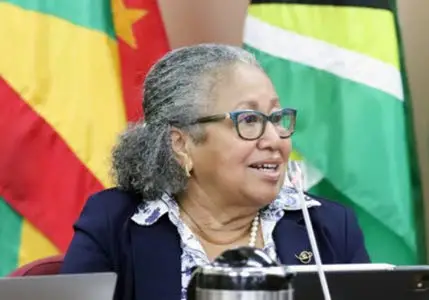GEORGETOWN, Guyana — Facing a volatile world economy and a spike in protectionist policies, trade chiefs from the 15-nation Caribbean Community (CARICOM) convened in Georgetown on Tuesday for a two-day strategy session of the Council for Trade and Economic Development (COTED).
Opening the 60th COTED, CARICOM Secretary-General Dr Carla Barnett warned delegates that recent tariff jolts—particularly those emanating from Washington—underscore how vulnerable the region remains when it leans too heavily on a handful of partners.
“Diversifying our commercial alliances is not optional; it is survival,” Barnett said, urging ministers to accelerate entry into fresh markets while strengthening existing ones.
A sharper external landscape
The United States has slapped broad-based duties on foreign imports, including a 10 per cent levy on most Caribbean goods and an eye-watering 38 per cent on certain Guyanese exports. Economists fear the move signals an era of widening trade skirmishes that could compress growth across small economies.
COTED’s agenda therefore pushes three priorities to the top of the pile:
- Resetting relations with Washington – crafting a unified CARICOM stance before the next round of talks.
- Wrapping bilateral talks with Colombia – a deal touted to unlock South American supply chains.
- Completing the Belize-El Salvador Partial Scope Agreement – a technical but pivotal step to smooth Central American commerce.
Home-grown hurdles
Barnett challenged the bloc to “trade more with itself,” noting that burdensome procedures and sporadic rule-breaking still hobble intra-regional commerce. A draft Regional Industrial Policy—slated for review at this meeting—aims to align manufacturing incentives, upgrade logistics, and remove the bureaucratic gravel that clogs cross-border trade.
No room for silos
With budgets tight and timelines tighter, Barnett called for closer coordination among CARICOM agencies, the Caribbean Development Bank, and the CARICOM Private Sector Organization. Joint research on shipping bottlenecks and tariff evasion, she argued, must translate into swifter policy fixes.
The clock is ticking
Ministers will also revisit the long-delayed overhaul of the Common External Tariff and Rules of Origin—a package seen as the backbone of any robust regional trade architecture. Barnett pressed delegates to exploit every flexibility within the Revised Treaty of Chaguaramas to break deadlocks this week.
Whether the session delivers concrete breakthroughs or yet another to-do list will become clear when gavel strikes at Wednesday’s close. For now, the Caribbean’s trade captains are on the clock—and the tide of global protectionism isn’t waiting.






